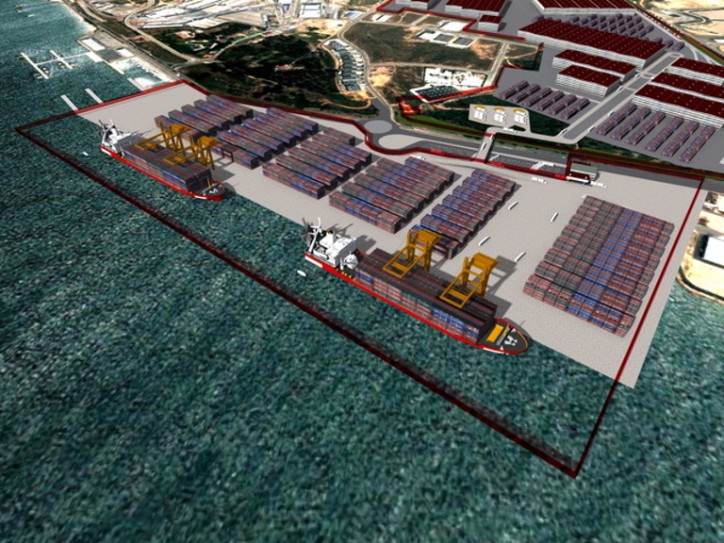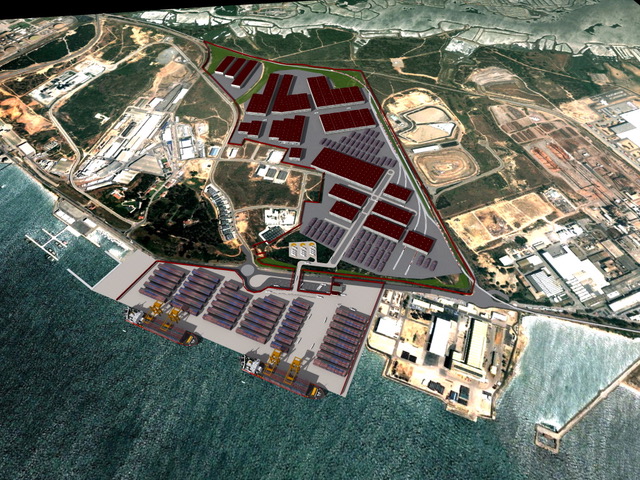Portugal’s Blue Atlantic has released new plans for an 800metre quay to berth two Panamax vessels showcasing its formidable maritime trade potential.
The 96-hectare site for sale in one of Europe’s leading maritime industrial zones is being primed for maritime, ports and logistics investors targeting the Iberian Peninsula and mainland Europe.

Blue Atlantic project lead Fernando Fernandes said it offers one of the fastest and most efficient routes in and out of Europe, bypassing the congested Mediterranean.
The prized industrial land with seaport access along global shipping routes and road and rail links is being sold by Portuguese holding services company Sapec. Located in the Mitrena Industrial Zone in Setubal Harbour, 40km south of Lisbon, it is the second closest port to Madrid.
“Blue Atlantic is a very large, empty plot of land with huge potential,” he said. “It is located in one of Europe’s largest and most commercially strategic industrial zones. It is currently undeveloped and has all the ingredients for a developer to create a world class multi-modal export hub or industrial and logistics park. We have named it Blue Atlantic after a concept to illustrate the key benefits of the site to potential investors. Our latest plans demonstrate the potential for an 800metre quay to berth two Panamax sized vessels alongside each other. This development would transform the commercial potential of the seaport facility accommodating multi-purpose vessels including containers, bulk and cargo carriers. It is ideally placed for any importer or exporter looking to harness the full trade potential of the Iberian Peninsula.”
The Port of Setubal is a world-renowned maritime export hub with several specialized terminals operated by private enterprises including Sadoport, TERSADO, AutoEuropa and Sapec for handling break bulk and general cargo, RO-RO, solid and liquid bulks and containers.
Mr Fernandes said the location is home to three of Portugal’s top four exporters and some of the region’s largest international enterprises including Volkswagen Autoeuropa, MEGASA (ex-Siderurgia Nacional) steel company, Navigator Papermill, GE factory and Sapec chemical and fertilizer industries.

“The Port of Setubal offers many commercial incentives,” he said. “It is sheltered with calm waters and a temperate climate with 300 days of sunshine a year. The port never closes ensuring maximum operational efficiency and its sandy and stable river bed is easy to modulate making maintenance cheaper than neighbouring harbours.
“The Setubal Peninsula is teaming with industrial and manufacturing businesses from cement factories to the globally renowned Lisnave Shipyard. A key factor attracting major industry to the region is the skilled local labour force and vocational training institutes. Setubal has a population of more than 82,000 and its lively economy is powered by activity from the sea, a factor that has led to the formation of a highly skilled industrial workforce.
“Setubal is also well connected to Portugal’s National Highway Network which is ranked as one of the best in the world for quality by the World Economic Forum. Meanwhile, the Blue Atlantic site has capacity to build a private railway line operating trains up to 880 metres in length linking to the National Railway System and a new railway connection reducing transport time to Spain by around three hours. Setúbal is just 600km away from Madrid, and these new and improved transport links create superb trade opportunities in the hinterland.
“All major industries in Portugal are strongly driven to export, with special emphasis on industrial supplies, consumer goods, transport material and accessories, machinery, food and drinking products, as well as fuels and lubricants. Blue Atlantic can be adapted to any of these types of markets.
“The site has a 380,000metre squared maximum construction capacity with much infrastructure already in place. This includes low and medium-voltage power networks, lighting and fibre optic communication networks including voice, data and CCTV feeds. It has treated household and industrial effluents, with connections to Cachofarra sewage treatment plant, as well as drinking water, natural gas and rainwater networks with retention and flood control equipment.”
Portugal has devised a national plan to maximise one of the longest maritime coasts in Europe at 942 km. Its EEZ– Exclusive Economic Zone – is the 3rd largest in the European Union and 11th largest in the world. However, new proposals seek to expand this economic zone from the current 200 miles of territorial sea to cover 350 miles, which will make it the 10th largest in the world.
“The sea is regarded as a ‘national plan for the future’ and the country has a firm strategy to promote maritime transport, naval construction, fishing and fish processing, among other activities,” said Mr Fernandes. “There has never been a better time to invest in Portugal and its key port locations such as Setubal which benefit from strong trade relationships with Spain, France, Italy, United Kingdom and Germany. We are also witnessing a surge in business activity with the CPLP countries (Community of Portuguese Speaking Countries) – which form a market of 250 million consumers. Any business looking to place their operation at Blue Atlantic could capitalise on long established trade connections with the likes of Angola and Brazil opening up gateways to broader markets across Africa and South America.”
Source: AJoT